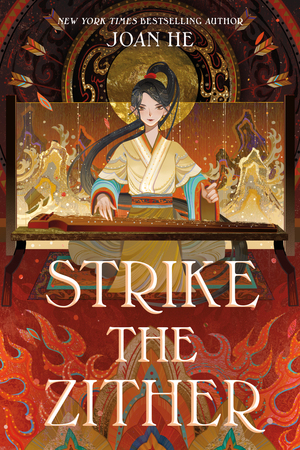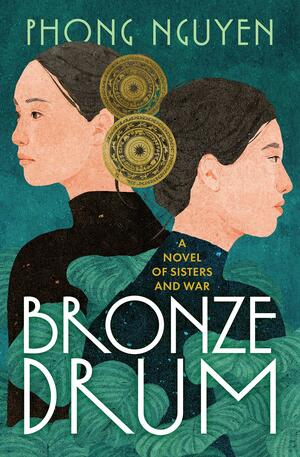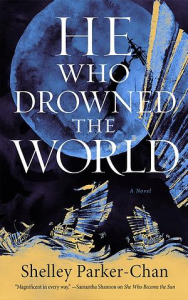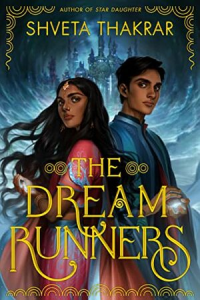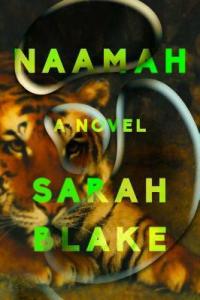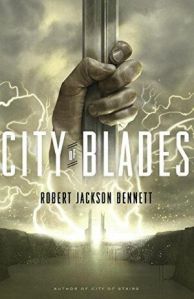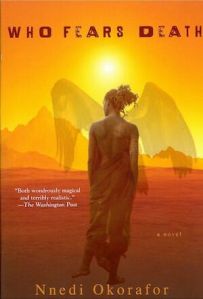Title: Strike the Zither
Series: Kingdom of Three #1
Author: Joan He
Genre: Fantasy (YA)
Trigger Warnings: Death, injury, blood, violence, war, parent death (mentions), terminal illness, alcohol use (mentions), child death (mentions), vomit (mentions), animal death (mentions)
Back Cover:
The Chinese classic Three Kingdoms reimagined with a lady Zhuge Liang.
The year is 414 of the Xin Dynasty, and chaos abounds. A puppet empress is on the throne, and three warlordesses each hope to claim the continent for themselves.
Only Zephyr knows it’s no contest.
Orphaned at a young age, Zephyr took control of her fate by becoming the best strategist of the land and serving under Xin Ren, a warlordess whose loyalty to the empress is double-edged—while Ren’s honor draws Zephyr to her cause, it also jeopardizes their survival in a war where one must betray or be betrayed. When Zephyr is forced to infiltrate an enemy camp to keep Ren’s followers from being slaughtered, she encounters the enigmatic Crow, an opposing strategist who is finally her match. But there are more enemies than one—and not all of them are human.
Review:
I didn’t realize when I picked this up that I’d already read one book by this author before – or at least attempted to read, as I DNF’ed Descendant of the Crane in 2021. But the back cover on this one sounded much more interesting, and I didn’t DNF the other book for being bad, just because I wasn’t able to get into it – which could very easily have been more about my mood than the book itself. So I gave this one a shot.
And at first, I was really glad I did. I didn’t love the world-building – I’ve read too many fantasies set in actual ancient China, so this Chinese-inspired world felt like a discordant mishmash of ideas instead of a cohesive world, but I could live with that. What I did like was Zephyr, who was clever, calculating, always three steps ahead of everyone else (a trait I love in a character), and some intriguing combination of dedicated to her warlordess and desperate to prove herself useful. And even though the plot involved a lot of politics, it wasn’t slow and managed to involve a fair bit of action and intrigue along the way.
The back cover really doesn’t tell you much about what’s in the book. The infiltration happens almost immediately, and while Crow is definitely an antagonist, he’s not really a major player in the story. Just about every bit of the story you think you’re going to read wraps up in part one. Then in part two things go way off the rails, and that’s where I started to really struggle.
My big criticism of the story itself is that it sacrifices background for speed, and that blunts any potential emotional impact. I don’t disagree with the choice – a long setup would have done the story a disservice. But often the reader finds out about crucial pieces of information the moment they’re supposed to be connected to an emotional moment, so the emotions have to share my attention with the process of mentally putting this new information into the overarching picture of the book. This also makes the big revelation at the start of part two feel unexpected, but in a jarring, random way. I may have had a different experience if I’d read Romance of the Three Kingdoms, the Chinese classic that this series is based on, but I haven’t. So maybe this is true to the original, but it was still difficult for me.
The problem I had with part two, and the reason I won’t be continuing the series, is definitely a case of it’s not the book, it’s me. A major event at the end of part one and a character’s response to it at the beginning of part two resulted in one major character ending up in the body of another major character. I do not like body-swapping. I can’t even really explain why, it just makes me extremely uncomfortable. It’s worse if the body-swapped characters try to pretend that they are the person whose body they’re in, which also happens here. So I spent most of part two wanting to leave the situation but also hoping that the characters would get back to the right bodies, because I was sure I would start to like it again once the body-swapping thing was fixed. But based on the ending and reading the back cover for the sequel, I think the characters are likely to stay in the wrong bodies until near the end of book two. And I do not want to deal with that.
On the whole, this is not a bad book by any means. It had a lot of aspects that didn’t do it for me, personally, but that’s not a judgement on the book itself. I’m having a hard time expressing any sort of overall opinion about it because the biggest thing I didn’t like about it (and quite possibly the smaller thing I didn’t like as well) were all matters of personal opinion. I like the ideas, it’s well-written, and it kept my interest despite being fairly politics-heavy. It just has some elements that aren’t for me, personally – but might be for you.
The Kingdom of Three Duology:
- Strike the Zither
- Sound the Gong

